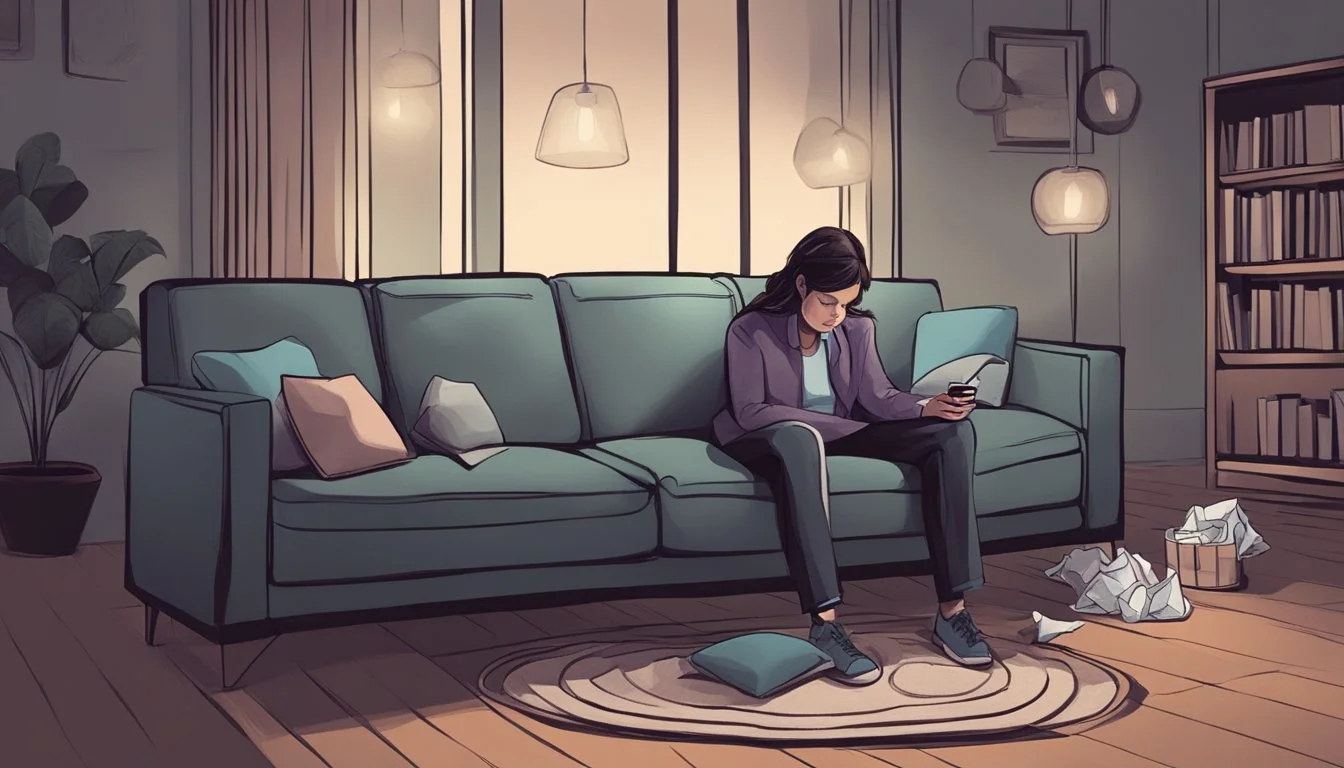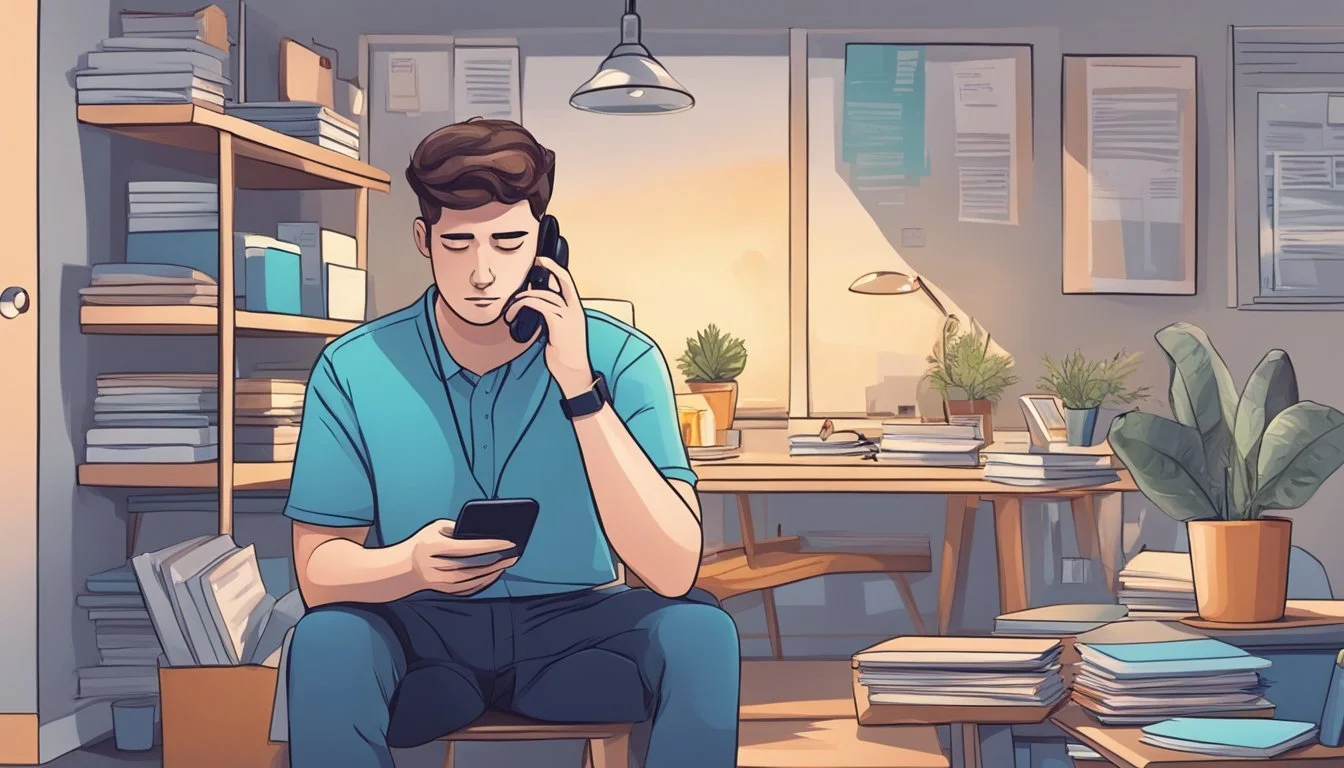12 Signs You May Be Emotionally Dependent on Your Partner
Understanding the Indicators
Recognizing emotional dependency in a relationship is crucial for maintaining a healthy partnership. Many individuals may not realize they exhibit signs of emotional dependence, which can impact their personal growth and the overall dynamic with their partner.
Understanding and identifying these signs can be the first step toward achieving a balanced and fulfilling relationship. By becoming aware of one's emotional needs and behaviors, individuals can work towards creating a more stable and supportive connection with their partners.
1) You Frequently Seek Reassurance from Your Partner
Frequent reassurance seeking is a common sign of emotional dependency. It can manifest as constantly asking your partner if they still love you or if they are happy with the relationship. This behavior often stems from insecurity and a lack of self-esteem.
Reassurance seeking can create strain in the relationship. The partner on the receiving end may feel pressured to provide constant affirmations, which can be exhausting. Over time, this can lead to frustration and even resentment.
In many cases, the need for reassurance is linked to past experiences or attachment styles. People with insecure attachment styles may be more prone to seeking reassurance. Therapy can help address these underlying issues.
Excessive reassurance seeking rarely results in long-term comfort. Instead, it can perpetuate a cycle of doubt and anxiety. Addressing the root causes of this behavior is crucial for a healthier relationship dynamic.
For further reading on reassurance in relationships, visit Marriage.com and Psychology Today. These resources provide valuable insights into the impact of reassurance seeking and methods to manage it.
2) You struggle to make decisions without your partner's input.
A common sign of emotional dependence is the inability to make decisions without your partner's input. This can manifest in everyday choices, such as what to eat or which movie to watch. This behavior often points to a deeper reliance on your partner to validate your decisions.
Such dependence can extend to more significant life decisions. Choosing a career path, where to live, or how to handle finances often requires independent thinking. If you constantly need your partner's approval, it may indicate you lack confidence in your own judgment.
Relying heavily on your partner for decision-making can lead to feelings of inadequacy. It places immense pressure on the relationship, as one partner becomes the primary decision-maker. This imbalance can hinder personal growth and autonomy, essential for a healthy relationship.
Recognizing this behavior is crucial. It helps to understand that healthy relationships involve mutual respect and support, not dependency. Encouraging an equal partnership where both individuals feel empowered to make decisions independently nurtures a more balanced and fulfilling relationship.
Practicing self-reliance can also involve setting personal goals and taking small steps toward decision-making without seeking constant validation. Building this confidence can contribute to a more robust and healthy relationship dynamic. For additional insights, consider exploring the article on emotionally co-dependent relationships.
3) You feel incomplete without being around your partner.
Feeling incomplete without being around your partner can be a key sign of emotional dependency. This sensation often manifests when individuals believe they cannot be happy or fulfilled unless they are with their partner.
This emotional reliance can create an unhealthy dynamic within the relationship. It may lead to feelings of anxiety or sadness when apart, driving a constant need for reassurance or presence.
Individuals may find themselves avoiding social activities or personal interests because they feel less whole without their partner. This behavior can limit personal growth and strain the relationship over time.
These feelings can indicate a belief that life lacks meaning without their partner, prompting an idealized view of the relationship. This perception can blur boundaries and hinder the development of a balanced, healthy connection.
Further exploration into this topic can be found on Healthline.
4) You always prioritize your partner over yourself.
In an emotionally dependent relationship, one may frequently put their partner's needs ahead of their own. This involves consistently sacrificing personal interests.
The person may neglect self-care and activities they once enjoyed. This can lead to feelings of resentment and diminished self-worth.
Such behavior often stems from a fear of losing the partner. This fear drives a need to ensure the partner's happiness at any cost.
For example, they might cancel plans with friends or family to attend to their partner. Over time, this can create an unhealthy imbalance in the relationship.
More details about this behavior can be found in the Healthline article on emotional dependency. Here, it's important to recognize that mutual respect and balance are keys to a healthy relationship.
5) You panic or feel extreme anxiety when you're apart.
When emotionally dependent on a partner, panic or anxiety often manifests when they are not around. This can include physical symptoms like a racing heart, sweating, and dizziness.
Anxiety can be so intense that it disrupts daily activities. They might find it challenging to focus on work or social engagements.
This intense fear of being alone can stem from a lack of self-confidence. Feeling incomplete without the partner's presence often leads to excessive worrying.
Some may also experience gastrointestinal issues. Anxiety linked to separation can cause symptoms like stomach pain or discomfort, as noted by Dr. Potter in SELF.
Furthermore, the mere thought of being apart can trigger these responses. Such overwhelming anxiety indicates an unhealthy reliance on the partner for emotional stability.
Learning to manage these feelings is crucial. Tools like mindfulness practices or seeking professional help can be beneficial.
Understanding that emotional dependency can manifest in physical and psychological ways is essential for addressing it. Seeking support from a mental health professional can aid in developing healthier emotional boundaries.
6) You neglect your own interests and hobbies.
Neglecting personal interests and hobbies is a key sign of emotional dependency. When someone's happiness hinges solely on their partner's approval, they may abandon activities they once enjoyed.
They might stop pursuing their own goals to prioritize their partner's needs. This can create resentment and a lack of fulfillment.
Engaging in hobbies independently is important for personal growth. It allows individuals to maintain a sense of self and ensures that the relationship does not become overwhelming. Without this balance, dependency can deepen.
Those who are emotionally dependent may feel their interests are less important. This belief can lead to giving up social activities and passions that previously defined their identity.
Relationships should support mutual growth. Maintaining separate hobbies prevents emotional burnout and fosters a healthier, more balanced connection.
7) You need constant communication with your partner.
Emotional dependency often manifests as a need for constant communication. Individuals may feel uneasy if they are not frequently in touch with their partner. This can result in numerous calls, texts, or messages throughout the day.
They might check their phone repeatedly and become anxious if there is no immediate response. This need extends beyond regular updates or conversations; they seek reassurance and validation through constant contact.
Some may feel that their partner does not care enough if they do not maintain frequent communication. This can lead to misunderstandings and unnecessary stress in the relationship, creating a cycle of dependency and frustration.
When someone heavily relies on continuous interaction with their partner, it may signify deeper insecurities or fears of abandonment. Recognizing this pattern is crucial.
For more information on emotional dependency, visit Healthline.
8) You feel your mood is heavily influenced by your partner.
Feeling that your mood swings or fluctuates based on your partner’s actions or feelings can indicate emotional dependency. When your happiness, sadness, or anxiety hinges on their behavior or mood, it suggests a lack of emotional autonomy.
People in such a situation may find their day uplifted solely by a positive gesture from their partner. Conversely, a minor disagreement or a cold response can lead to an immediate downturn in their mood. This dependency can make emotions unpredictable.
Over time, relying on a partner for emotional stability can lead to stress and frustration. It becomes difficult to maintain an independent sense of well-being.
Recognizing this pattern is crucial for fostering a healthier, more balanced relationship. Self-awareness and emotional independence can prevent emotional exhaustion.
For more insights, you can refer to these subtle signs of emotional dependency.
9) You find yourself constantly worrying about your partner's opinions.
Constantly worrying about your partner's opinions can be a sign of emotional dependency. When someone is emotionally dependent, they may seek constant validation from their partner. This fixation can lead them to overanalyze their partner's reactions to everything they do or say.
This constant worry can make everyday decisions stressful. Whether it’s about what to wear or what to say in social settings, every choice might be influenced by how they think their partner will react. This behavior can hinder a person's ability to make independent choices and feel confident in their decisions.
In such cases, individuals may avoid expressing their own opinions or desires. They might fear that disagreement or expressing their true self could lead to disapproval or conflict. This compromises their authenticity and can lead to dissatisfaction in the relationship.
Finding a balance is crucial. It’s important to value a partner’s opinion but also to maintain one's own identity and self-worth. Being able to respect each other's opinions without fear or anxiety can help create a healthier and more balanced relationship. For additional details, feel free to check out the insights on relationship anxiety and how it can manifest in various ways.
10) You have a persistent fear of your partner leaving you.
Individuals who are emotionally dependent often experience a persistent fear that their partner might leave them. This anxiety can manifest as frequent thoughts that their partner will abandon them or end the relationship unexpectedly.
This fear can lead to behaviors like constant need for reassurance. They may repeatedly seek affirmation that their partner loves them and won't leave. It’s a sign of underlying insecurity and anxiety.
Such fears can cause significant distress. People may experience physical symptoms of anxiety, such as stomach issues or restlessness. This persistent worry can intrude on daily life, making it hard to relax or find peace in the relationship.
This type of fear is also linked to abandonment issues. Individuals with these issues may attach too quickly in relationships, trying to secure their partner's commitment to avoid the pain of potential separation.
Recognizing this fear is crucial. It’s important to address these feelings before they lead to unhealthy behaviors. Therapy or counseling can help individuals work through these anxieties and build a more secure sense of self.
11) You sacrifice your own needs to please your partner.
When individuals start putting their partner’s needs above their own, it's a sign of emotional dependence. They may find themselves giving up hobbies, friendships, or even career opportunities.
Constantly prioritizing a partner's desires can lead to personal dissatisfaction. This can become apparent when someone skips self-care activities because their partner requests time or attention. Over time, this pattern may cause significant stress and mental fatigue.
Such sacrifices often create an imbalance in the relationship. The individual who sacrifices might begin to feel unappreciated or taken for granted. It's also possible that their partner starts to expect this behavior regularly, leading to a power imbalance.
Emotional dependence often prevents healthy boundary-setting. Without boundaries, individuals can't maintain their individual identity. This makes it difficult to pursue personal growth and happiness. It is important to recognize these signs early to address them constructively before they lead to resentment.
12) You frequently feel jealous or insecure.
Feeling jealous or insecure often can be a sign of emotional dependency. This could include not trusting your partner when apart or feeling uneasy about their interactions with others.
Some might find themselves constantly checking their partner's social media or questioning their partner’s whereabouts. These behaviors may stem from a fear of losing the relationship.
Insecurity often leads to needing constant reassurance from the partner. This need can manifest as seeking praise or validation to feel secure within the relationship.
Individuals may also experience frequent comparisons to others, leading to feelings of inadequacy. Observing how others interact with their partner could intensify these insecure feelings.
Emotional dependency can cause a person to project their own insecurities onto their partner. This might result in misinterpreting innocent actions as threats to the relationship.
For more insights on signs of jealousy, one might find useful information in this WebMD article. Understanding these signs can help identify and address emotional dependency more effectively.
Understanding Emotional Dependence
Emotional dependence is a condition where one's emotional stability relies heavily on another person. It differs from healthy emotional support and can negatively impact self-esteem and relationship health.
Definition and Characteristics
Emotional dependence involves feeling incomplete without another person. It often leads to an idealized view of the partner, making the person believe that they cannot be happy or find meaning in life without the other.
Signs include needing constant reassurance and validation from the partner and fearing abandonment. These dependencies can create an imbalance, where one person becomes overly reliant, leading to potential issues within the relationship.
Difference Between Emotional Support and Dependence
Emotional support is a fundamental aspect of healthy relationships. It involves mutual care, encouragement, and the ability to share feelings.
In contrast, emotional dependence is marked by a need for constant support to feel secure. When needing turns into dependency, it can lead to an unhealthy reliance where one cannot function without the other's presence.
Recognizing this difference helps in maintaining healthy boundaries and ensuring both partners can thrive independently while still providing support. For more detailed information, you can refer to this article on recognizing the signs of emotional dependence.
Psychological Impacts of Emotional Dependence
Emotional dependence on a partner can impact various aspects of an individual’s psychological well-being. Two vital areas affected are mental health and self-esteem.
Effects on Mental Health
Excessive emotional reliance on a partner can lead to significant mental health challenges. Individuals might experience constant anxiety and stress due to fear of abandonment. This anxiety can disrupt daily functions and reduce overall quality of life.
Persistent emotional dependence often turns into a cycle of seeking approval and experiencing distress when it is not provided. This cycle may contribute to depression and feelings of inadequacy. Emotional dependence can overshadow personal needs, leading to neglect of self-care and exacerbating mental health issues.
Impact on Self-Esteem
The impact on self-esteem is profound. When a person relies excessively on their partner for validation, their confidence may diminish. This dependency means the individual’s self-worth becomes tied to their partner’s opinions and actions, creating a fragile sense of self.
Over time, this pattern can erode the individual’s ability to make decisions independently. Lack of autonomy and constant need for reassurance hinder personal growth. This decreased self-confidence can impact other areas of life, including professional and social interactions, perpetuating a cycle of low self-esteem.
How to Address Emotional Dependence
Addressing emotional dependence involves seeking external support and strengthening one's personal resilience. These strategies can empower individuals to find balance and independence in their relationships.
Seeking Professional Help
Engaging with a therapist or counselor can provide invaluable assistance. Professionals are trained to help identify the roots of emotional dependence. They can guide individuals through techniques like cognitive-behavioral therapy (CBT) to reframe negative thought patterns.
Support groups also offer a sense of community and shared experiences. Group therapy allows individuals to learn from others facing similar challenges. This can be particularly effective in breaking the cycle of dependence.
It's important to be open and honest during therapy sessions. Expressing feelings and fears candidly can lead to deeper insights and more effective coping strategies. Regular sessions help maintain progress.
Building Personal Resilience
Developing personal interests and hobbies is crucial. Engaging in activities like yoga, painting, or learning a new language fosters a sense of accomplishment and independence. These activities also provide a mental break from relationship-focused thoughts.
Setting and pursuing personal goals can also build resilience. This might involve career aspirations, fitness targets, or educational pursuits. Achieving these goals boosts self-esteem and reinforces the ability to thrive independently.
Practicing self-care is another key component. This includes maintaining physical health through regular exercise, eating well, and getting enough sleep. Emotional self-care might involve journaling, meditation, or spending time with supportive friends.
By focusing on these areas, individuals can cultivate a strong sense of self that does not rely solely on their partner. This approach helps create healthier, more balanced relationships.






